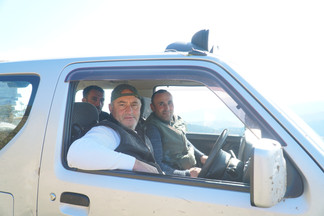Photo Essay | Fresh Air and Fall Colours in Adigeni, Georgia
- Carmen Kuntz
- Oct 25, 2023
- 4 min read
Updated: Apr 24, 2024
Following the Eco-Corridors Fund for the Caucasus (ECF) annual Regional Consultative Forum on Thursday 19 October in Tbilisi, the ECF team took advantage of the warm and sunny fall weather to get out of the city and visit the region of Adigeni, where the ECF has been working with locals since the project’s inception.

After spending the morning in meetings and interviews in the WWF and ECF office, two vehicles rolled out of Tbilisi heading north. As the highway turned west towards Borjomi, the cityscape was replaced by the rolling hills and golden fall hues. Participating in this field visit were: Irakli Gogoladze, ECF National Coordinator for Georgia; Khayyam Ismayil ECF National Coordinator for Azerbaijan; Jernej Stritih, ECF Chief Technical Advisor; Maka Bitsadze, Regional Conservation Manager for WWF Caucasus; Akaki Chalatashvili, WWF Regional Environmental and Social Safeguards/Regional Risk and Quality Assurance Manager; Carmen Kuntz, ECF Communications Manager; and Nigel Dudley, the ECF's special guest and forum keynote speaker from the UK.
An internationally renowned expert in community-based nature conservation, Nigel Dudley is one of the most widely published and well-recognized experts in the field. Together with his wife Sue Stolton they make up a consulting firm called Equilibrium Research and have been involved in nature conservation globally for over 3 decades. During this year’s Regional Consultative Forum, the primary theme of discussion was the opportunities and application of community conservation through “Other Effective Conservation Measures” (OECMs). It was a special honour to have Nigel attending, presenting, and participants in the forum. And those traveling to Adigeni made the most of the opportunities to speak with Nigel about his experience implementing OECMs in the national systems.

After overnighting in the city of Akhaltsikhe, the group drove north west along the Kvabliani River and into the mountain villages, first stopping in the village of Mokhe where the three local wildlife caretakers, leader of the CBO and a number of locals all actively involved with the ECF Programme met with the ECF team and guests. Standing in the sun with a view of the forests, pastures and mountains where the ECF is active, many small discussions took place. With the help of translation, Nigel was able to ask the caretakers about the work they do, the challenges they face and their monitoring techniques. And in turn the Mokhe locals and ECF/WWF staff were able to ask Nigel about the applications of community-based nature conservation, learning from his experience globally.
From there, the local CBO leader Badri Vashakmadze and the three young wildlife caretakers from Mokhe joined the convoy in their ECF caretaker vehicle, leading the way through the villages of Tsikhisubani, Naminauri, Dertseli and Kikibo. These villages were some of the first to be involved in the ECF Programme back in 2015 and have become an example for the project regionally. The locals are proud to host guests and open to discussing the challenges, rewards and future hopes and plans with the ECF Programme.
The convoy traveled through forest, pasture and field landscapes, illustrating the variety of ecosystems (and elevations) that the ECF works in. The final destination was the summer pasture of the village of Akhalsheni, at some 2100 meters. Visitors and locals alike were able to enjoy the view of the surrounding Shavnabada and Persati mountains.
These summer pastures offered a tangible example of the close working interactions local communities have with the landscape, highlighting an important feature of the ECF, which is that nature conservation should not negatively affect the local communities, and ideally even improve it.
Through grazing livestock (predominantly cows, but also sheep and goats), these pastures provide food that allows these communities to get through the long Georgian winters, continuing animal husbandry traditions that have existed in these mountains for hundreds/thousands of years.
On the way down, the group stopped to explore a 10th century fortress now hidden in the thick forest. Standing beneath the ancient stone walls of the fortress, they discussed the potential for tourism at points of interest such as this.
A special invitation was extended to the ECF visitors, and a Georgian supra (feast) was prepared and served in the home of the CBO leader Jemal Shavadze in the village of Dertseli.
In proper supra style, the plates were stacked on top of each other and many toasts were exchanged, both celebrating the positive impacts of the ECF so far, and wishing well for the future of not only the project, but of all community-based nature conservation in the region.
No one was ready for the gathering to end, but the need to get back to Tbilisi for flights provided reason to say the last toasts, exchange hugs and handshakes and get back on the road for the four hour drive back to the city.
The eagerness and dedication of locals in the forest and pastures, the generosity of sharing local, homegrown and handmade food, and the overlap of methodologies, strategies and on-the-ground hard work made for a memorable visit to a region of Georgia that illustrates the effectiveness and importance of the ECF Programme.
Many thanks to the community of Dertseli for the wonderful food and to all the communities of the ECF who are working hard to create long-term eco-corridors.

























































































